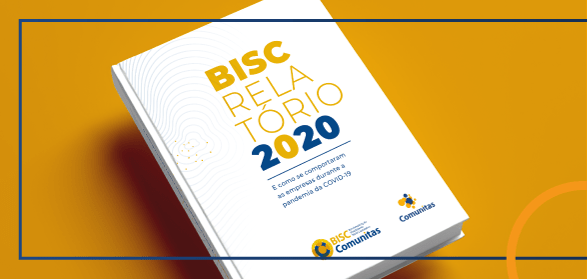Brazil and the world were deeply challenged by the COVID-19 pandemic. Last year, Brazil had faced an unprecedented sanitary global crisis that widened the social and economic gap, which presented unique opportunities for innovation.
The urgency and gravity of the situation motivated all sectors of the economy to act in a systemic and integrated way, according to their potential. The Brazilian corporate response was focused mainly on strengthening income generation of the most vulnerable families and supporting public health.
The local context was improving in part because of the Unified Health System (SUS), a Brazilian public policy that provides broad access to basic and complex health services to the entire population, free of charge. Despite SUS universality, it needed to be better equipped to face COVID-19.
The 2020 edition of BISC* survey, Benchmarking of Corporate Social Investment, shows the role that Private Social Investment played in this scenario: 73% of the BISC Network companies supported the implementation or the expansion of hospitals; 67% of companies provided support for the functioning of public health services; 67% sought to stimulate local production of health protection materials and equipment; 58% invested in supporting income-generating projects for workers in cooperatives of various categories, and 50% invested in research development.
Comunitas, a Brazilian Think and Do Tank, and CECP’s Global Exchange in Brazil, mobilized more than R$ 50 million** private sector resources in the first half of 2020 to: 1) purchase equipment, resulting in the implementation of more than 200 new ICU beds in public hospitals in the country and 2) match fund of the São Paulo State Government on cash transfer program, for four months, to 113 thousand most vulnerable families in the state with children in the public school system and in extreme situations poverty
Comunitas also mobilized R$ 170 million*** in donations from the private sector for the expansion of the Butantan Institute factory to produce CoronaVac, developed in partnership with the Sinovac laboratory. The new installation will be ready in October 2021 and will enable an additional production of 100 million doses per year. The factory expansion aims to reinforce the production of several other vaccines already produced by the Institute, leaving a legacy for the country that transcends the fight against the pandemic.
Comunitas’ role was not limited to fundraising for the new factory plant. The organization is part of the project governance and leads it, together with the São Paulo State Government and the Butantan Foundation. The shared management model, that brought efficiency to the process and enhanced the planning, was a key success factor to engage companies to donate. The governance model has ensured a more collaborative and engaging project decision-making process such as receiving funds, legal modeling, construction of the new plant and communication.
COVID-19 reinforced the importance of private sector awareness. Companies understood that the integration of their actions with public policies and with other companies/organizations would allow for scalability of their initiatives
The 2020 edition of BISC survey points out 8 recommendations in confronting COVID-19, and are seen as best practices from social investors of 14 business conglomerates (representing 303 companies and 18 institutes) ****.
- Build a good governance structure
- Value the company’s expertise, but not allow it to be limited by previously adopted rules and models
- Empower employees and strengthen corporate volunteering
- Align social action with business
- Associate emergency actions with emancipatory initiatives
- Listen to governments and communities
- Work through a network of stakeholders
- Adopt good communication strategies
It goes without saying that the next two years have a high level of uncertainty. Half of the BISC Network companies do not know what the future will be like and 1/3 of them intend to increase their investments (BISC, 2020). But even if uncertain, none of these companies intend to reduce the amounts currently destined to social actions – from March to December 2020, the BISC survey companies’ network has been responsible for donating 1/3 of all resources raised to face the pandemic, according to data from the Donation Monitor*****.
Different sectors are expected to become ever more collaborative on designing and implementing solutions to benefit the society and to achieve this, social investment efficiency needs to be prioritized together with innovative and successful models of shared management so public impact projects can prosper each day.
*13th edition of the annual survey developed by Comunitas – www.comunitas.org.br
** Equivalent to USD 8,962,650
*** Equivalent to USD 30,473,010
**** Topics systematized from the quantitative data of the research and from interviews with representatives of the network
***** Find more in: https://www.monitordasdoacoes.org.br/pt


